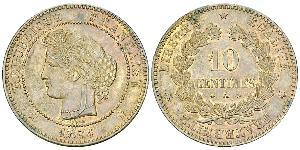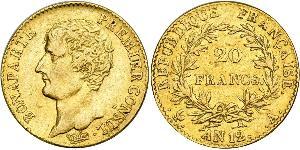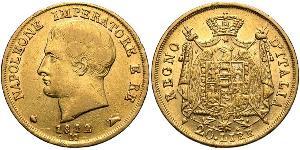40 Franc First French Empire (1804-1814) Gold Napoleon (1769 - 1821)
1806, France (1st Empire), Napoleon I. Gold 40 Francs Coin. (12.85g) Turin mint! Mint Year: 1806 Mintage: 59,000 pcs. Denomination: 40 Francs Engraver: Pierre-Joseph Tiolier
Reference: Friedberg 482, KM-675.5.Mint Place: Turin (Italy, under French Occupation)
Material: Gold (.900) Weight: 12.85gm Diameter: 26mm Obverse: Bare head of Napoleon Bonaparte left. Designer’s signature (DROZ F.) inside bust truncation. Comment: Engraver´s monogram (Pierre-Joseph Tiolier) below bust. Legend: NAPOLEON EMPEREUR . Reverse: Denomination (40 FRANCS) within wreath. Legend: REPUBLIQUE FRANCAISE (privy mark: heart) 1806. U A heavy and beautiful gold coin, with low mintage, significant historic importance and a good investment oportunity! em>. Napoleon Bonaparte (15 August 1769 – 5 May 1821) later known as Emperor Napoleon I, was a military and political leader of France whose actions shaped European politics in the early 19th century. Born in Corsica and trained as an artillery officer in mainland France, Bonaparte rose to prominence under the First French Republic and led successful campaigns against the First and Second Coalitions arrayed against France. In 1799, he staged a coup d'état and installed himself as First Consul; five years later he crowned himself Emperor of the French. In the first decade of the nineteenth century, he turned the armies of the French Empire against every major European power and dominated continental Europe through a series of military victories. He maintained France’s sphere of influence by the formation of extensive alliances and the appointment of friends and family members to rule other European countries as French client states. The French invasion of Russia in 1812 marked a turning point in Napoleon’s fortunes. His Grande Armée was badly damaged in the campaign and never fully recovered. In 1813, the Sixth Coalition defeated his forces at Leipzig; the following year the Coalition invaded France, forced Napoleon to abdicate and exiled him to the island of Elba. Less than a year later, he escaped Elba and returned to power, but was defeated at the Battle of Waterloo in June 1815. Napoleon spent the last six years of his life under British supervision on the island of Saint Helena. An autopsy concluded he died of stomach cancer, though Sten Forshufvud and other scientists have since conjectured that he was poisoned with arsenic. The conflict with the rest of Europe led to a period of total war across the continent; his campaigns are studied at military academies the world over. While considered a tyrant by his opponents, he is also remembered for the establishment of the Napoleonic code, which laid the administrative and judicial foundations for much of Western Europe.
View all coins in the group
(835 X 416pixels, file size: ~86K)
Posted by: anonymous 2015-12-14
Ausländische Münzen und Medaillen Frankreich 40 Francs 1806 U, Turin. Gadoury 1082, Friedberg 482. GOLD. Sehr schön
(837 X 417pixels, file size: ~87K)
Posted by: anonymous 2015-12-14
Ausländische Münzen und Medaillen Frankreich 40 Francs 1806 A. Gadoury 1082, Friedberg 481. GOLD. Sehr schön +
(1200 X 594pixels, file size: ~347K)
Posted by: anonymous 2015-09-28
France. Napoleon I (1804-1814). 40 francs, 1807 M Toulouse (Av - 12,90g). G. 1082a, F. 539/3, KM A688.1, Fr. 486. 4.940 ex. Rare. Very fine.
(680 X 338pixels, file size: ~87K)
Posted by: anonymous 2015-09-25
40 francs or, Lille 1807. Atelier varié. - Références : Gadoury 1082a - Friedberg 483 - Or. 12,88g. 6 043 ex. Très Beau. Très Rare.
(680 X 335pixels, file size: ~85K)
Posted by: anonymous 2015-09-25
40 francs or, Limoges 1807. Atelier varié. - Références : Gadoury 1082a - Friedberg 485 - Or. 12,90g. 1 859 ex. Très Beau à Superbe. Très Rare.
(680 X 337pixels, file size: ~84K)
Posted by: anonymous 2015-09-25
Nouveau type. 40 francs or, Paris 1807. Type transitoire. A/. Tête nue à gauche. Par J. P. Droz. Signé Tiolier directeur. R/. Valeur, lettre d’atelier et millésime. - Références : Gadoury 1082a - Friedberg 481 - Or. 12,88g. 11 689 ex. Très Beau à Superbe.
|
8 Real Bolivia Silver Philip III of Spain (1578-1621) / Phil ...
group has 9 coins / 8 prices
⇑

-500-250-82zBwcI0sJQAAAEsXkPTwwkH.jpg)
-300-150-0hMKbzbiuDgAAAFRzmSWyp4j.jpg)
-300-150-iFoKbzbiuRIAAAFREhKWyp4j.jpg)
-300-150-ixsKbzbiQdgAAAFQ7y7krhWW.jpg)
-300-150-JDQKbzbixawAAAFQAOzkrgXU.jpg)
-300-150-mTwKbzbi4zAAAAFQXmfkrgXT.jpg)
-300-150-JvMKbzbiBzYAAAFQRMLkrgXS.jpg)














